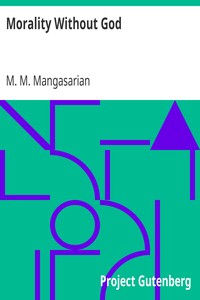Morality Without God by M. M. Mangasarian
"Morality Without God" by M. M. Mangasarian is a philosophical lecture published in the early 20th century, specifically in 1905. The book tackles the contentious question of whether morality is possible without belief in a deity. Through a vigorous critique of traditional religious thought, it explores the independence of moral principles from religious dogma, arguing that moral behavior can exist outside the confines of religious belief. In the text, Mangasarian makes the
case that morality is not only possible without God but that the association of moral behavior with religious belief is largely a manipulation to sustain religious ideologies. He critiques the notion pervasive among theologians that morality inherently relies on a belief in God, suggesting instead that moral actions stem from human empathy, social needs, and a natural sense of right and wrong. By analyzing historical and philosophical perspectives, he highlights how ethical behavior exists independently and can flourish based on reason and human experience rather than divine mandates or fear of punishment. The lecture ultimately aims to liberate moral thought from theological constraints, framing it as a natural part of human existence. (This is an automatically generated summary.)
Read or download for free
| How to read | Url | Size | |||
|---|---|---|---|---|---|
| Read now! | https://www.gutenberg.org/ebooks/45387.html.images | 77 kB | |||
| EPUB3 (E-readers incl. Send-to-Kindle) | https://www.gutenberg.org/ebooks/45387.epub3.images | 98 kB | |||
| EPUB (older E-readers) | https://www.gutenberg.org/ebooks/45387.epub.images | 96 kB | |||
| EPUB (no images, older E-readers) | https://www.gutenberg.org/ebooks/45387.epub.noimages | 90 kB | |||
| Kindle | https://www.gutenberg.org/ebooks/45387.kf8.images | 208 kB | |||
| older Kindles | https://www.gutenberg.org/ebooks/45387.kindle.images | 201 kB | |||
| Plain Text UTF-8 | https://www.gutenberg.org/ebooks/45387.txt.utf-8 | 65 kB | |||
| Download HTML (zip) | https://www.gutenberg.org/cache/epub/45387/pg45387-h.zip | 96 kB | |||
| There may be more files related to this item. | |||||
Similar Books
About this eBook
| Author | Mangasarian, M. M. (Mangasar Mugurditch), 1859-1943 |
|---|---|
| Title |
Morality Without God A Lecture Delivered Before the Independent Religious Society |
| Note | Reading ease score: 67.1 (8th & 9th grade). Neither easy nor difficult to read. |
| Credits |
Produced by David Widger from page images generously provided by the Internet Archive |
| Language | English |
| LoC Class | BJ: Philosophy, Psychology, Religion: Ethics, Social usages, Etiquette, Religion |
| Subject | Ethics |
| Subject | Christian ethics |
| Category | Text |
| EBook-No. | 45387 |
| Release Date | Apr 14, 2014 |
| Copyright Status | Public domain in the USA. |
| Downloads | 99 downloads in the last 30 days. |
| Project Gutenberg eBooks are always free! | |

